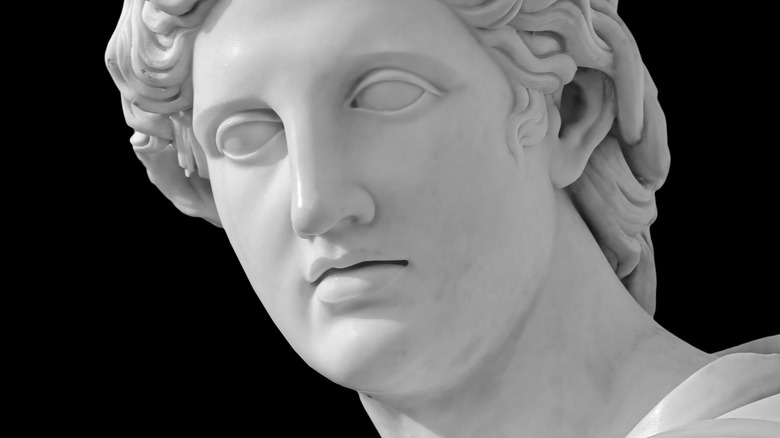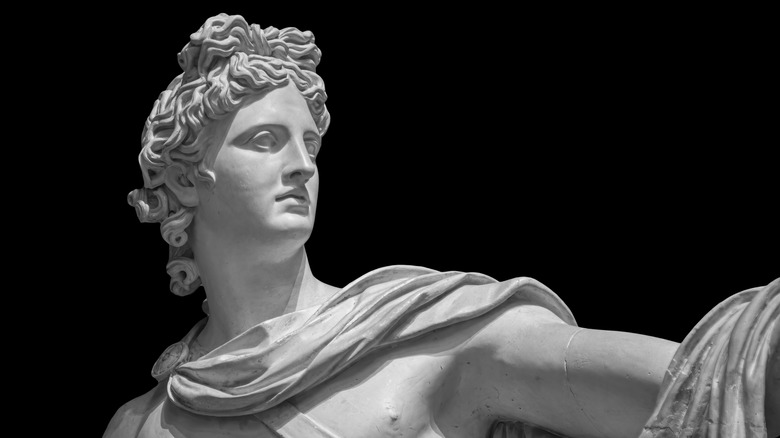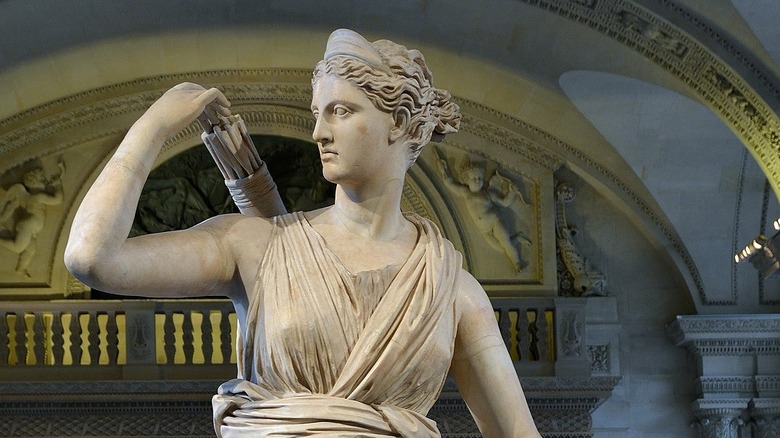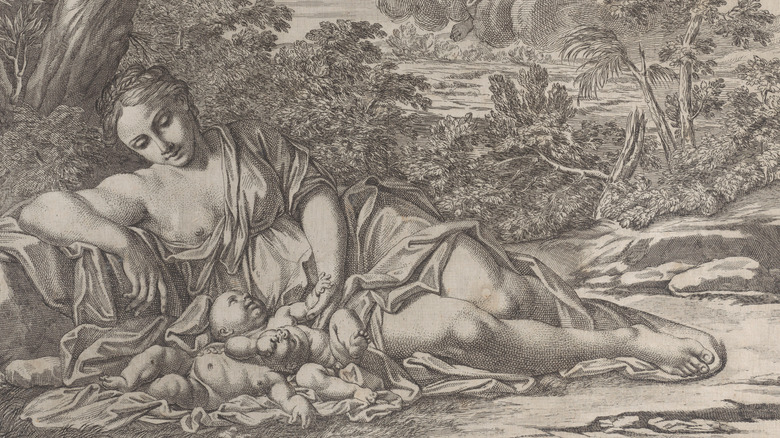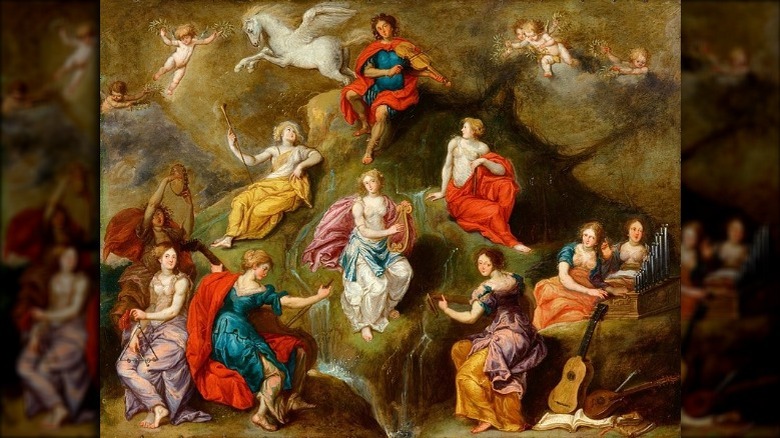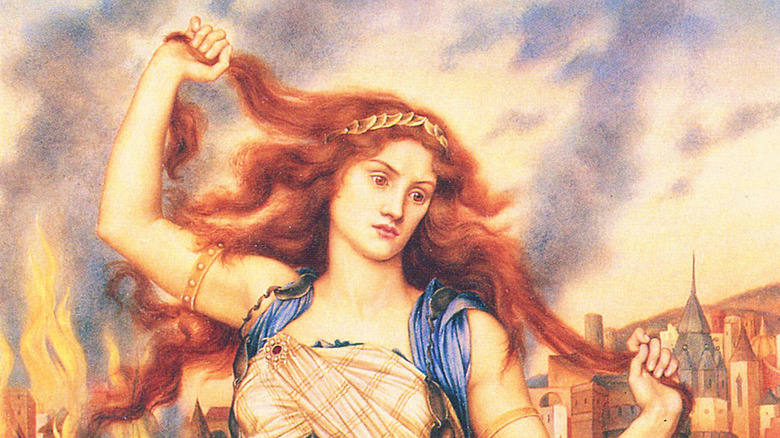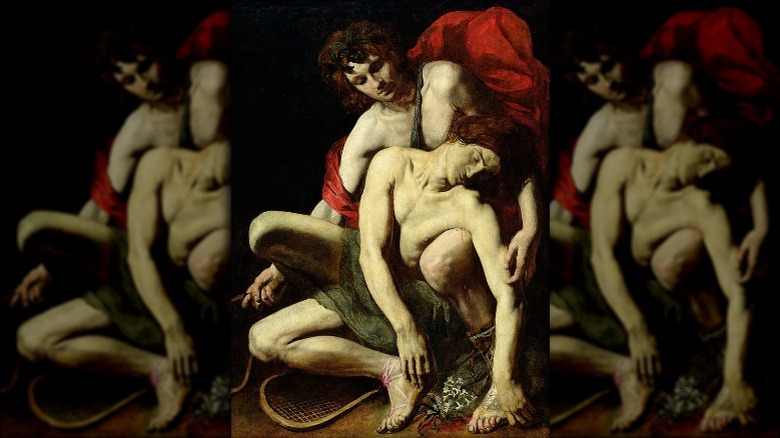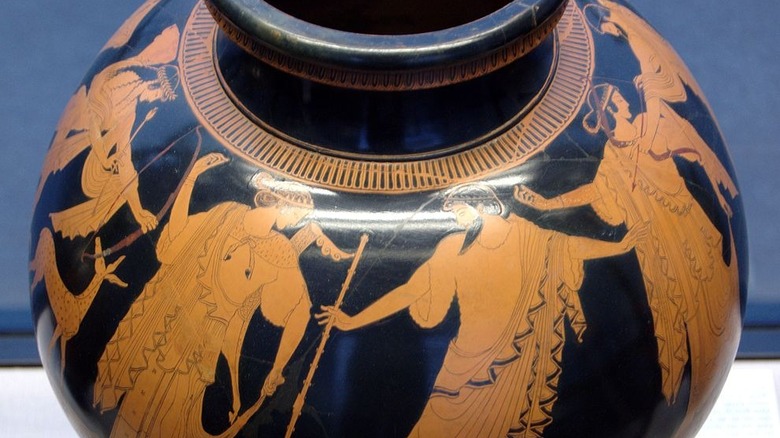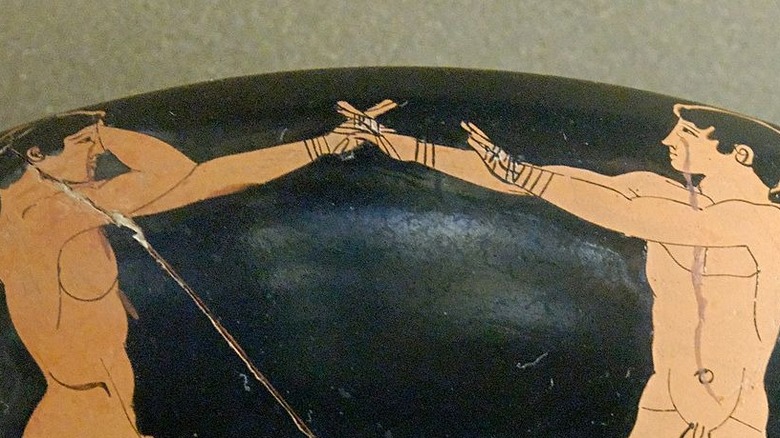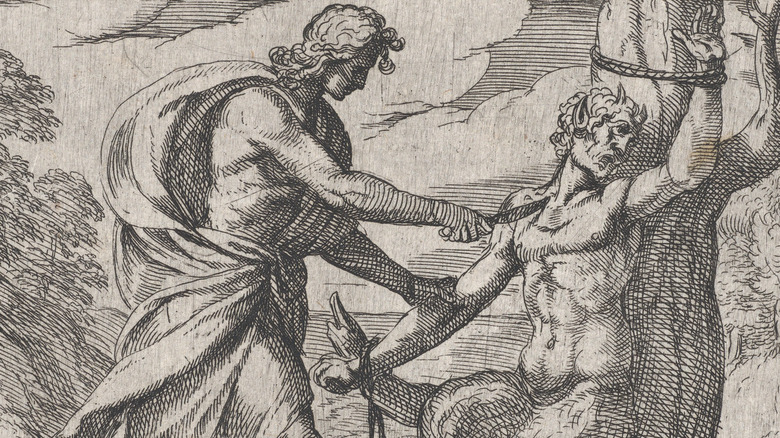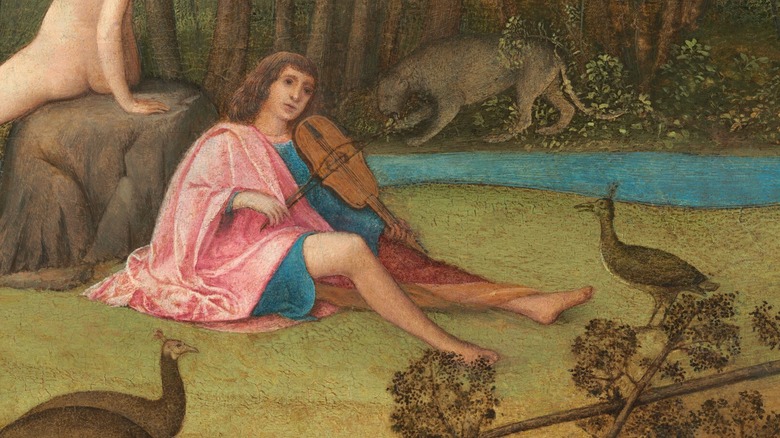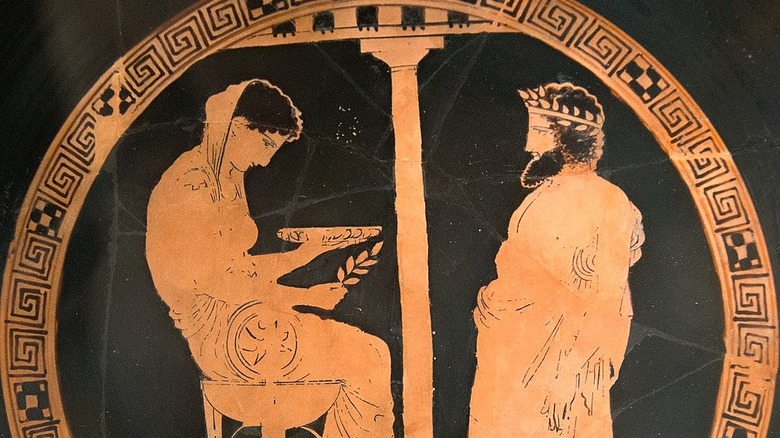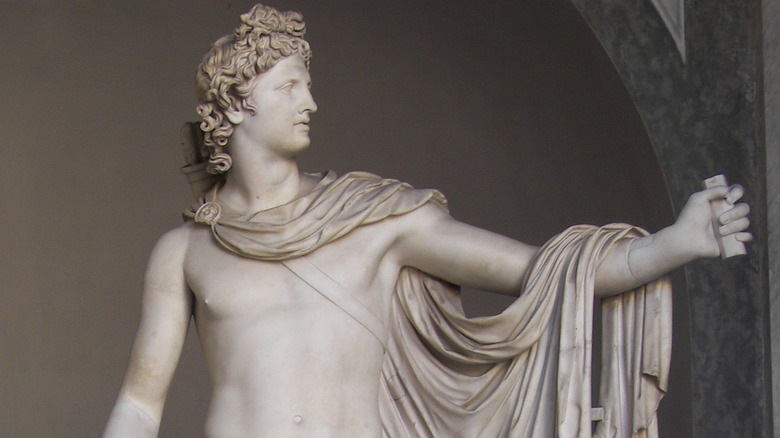The Mythology Of Apollo Explained
According to Greek mythology, the universe was ruled by 12 gods known as the Olympians, each with a different dominion. One of the most beloved was Apollo, often depicted as a handsome, strong young man. Apollo was particularly dear to the ancient Greeks because of all the beautiful things he represented — the sun and light, music, dance, poetry, knowledge, even beauty itself. He was known as a talented lyre player, a fierce archer, a healer, and a guardian of political order and peace.
Greek deities weren't free of vice — and this was certainly true of Apollo. The god was famous for his lust and pursued dozens of potential lovers, including those who were already in relationships. He also had quite the temper, and would brutally destroy anyone who challenged his greatness. Nevertheless, he was admired for his creativity, graciousness, reason, and care for his devotees.
Eager to enlighten yourself? Read on to learn all about this most resplendent figure. This is the mythology of Apollo explained.
The meaning of his name is debated
Most Greek gods were known by different names in Rome. Not so with this deity, who went by "Apollo" far and wide. What significance did this storied moniker hold? Scholars actually aren't quite sure.
According to GreekMythology.com, Apollo was often understood to mean "destroyer," "redemptory," or "purifier" by the ancient Greeks. However, some experts believe that etymologically, the name comes from the Greek word apella, meaning "a sheepfold." This would suggest that the Greeks considered Apollo a protector of herds.
Mythopedia offers several alternative explanations. The name might have been derived from apéllai, or "an assembly"; this would make Apollo "he of the assembly," referring to "his reputation as the bringer of civilized order." It might also be related to apeilé, or "a promise, boast, or threat," signifying the god's boldness. In any case, the name has had quite the powerful legacy — NASA chose to call their space program "Apollo" because of its connotations of greatness and daring.
Apollo's sister was the powerful goddess Artemis
Many of the Olympians were siblings. Such was the case for Apollo and Artemis. According to the World History Encyclopedia, the sun god's twin sister was just as powerful as he: she had her own bow and arrow, and was known for using them on trips into the forest with her pack of hounds. Therefore, she is called "the goddess of the hunt," and is associated with wild animals, nature, and the moon.
Artemis never courted or married, opting instead to live a single life of running through the woods with her dogs and nymph companions. Therefore, she is also considered the goddess of chastity. As someone who spent most of her time with female companions, she was deemed the patron of girls and women, as well. In ancient Greece, it was traditional for brides-to-be to donate their toys to her before marriage, symbolizing their transition into adult womanhood and its associated responsibilities.
Apollo fought a dragon when he was only four days old
Apollo and Artemis might have been Olympians, but they didn't exactly have a royal birth. As stated on GreekMythology.com, the two were conceived by Zeus and the Titaness Leto — which did not sit well with Hera, Zeus' wife. Enraged, she sent the dragon Python to chase her across the land — and also "forbade her to give birth anywhere on solid earth." She traversed Greece looking for a place to take shelter, but nowhere would accept her but the island of Delos, where she delivered her children in the branches of an olive tree.
Artemis and Apollo grew big and strong on a diet of nectar and ambrosia. When he was four days old, according to Greek Gods Info, he was given a gift: a silver bow with golden arrows, crafted by Hephaestus (the god of blacksmiths). Apollo immediately knew what he was going to do with this present. He journeyed to Python's cave, hoping to seek revenge. The beast immediately lunged to attack him, but he was quick. He shot an arrow right into Python's head, killing him once and for all.
Apollo presided over the nine muses
The muses, as stated on Theoi, were the goddesses of the arts and memory, considered a source of inspiration to Greece's greatest poets. As such, they were often linked to Apollo, who was known as the leader of their heavenly choir. Scholars disagree on the god's exact relation to these minor deities. Some accounts state that he was their consort; others say that they were all virgins. In any case, it's clear that he spent a good deal of time with them and considered them dear to him.
According to Hesiod's "Theogony" (per GreekMythology.com), there were nine muses. Later poets assigned a specific realm to each one. Some reigned over fields of knowledge like history and astronomy, while others presided over genres of poetry and performance. The World History Encyclopedia describes them as "bringers of festivity and joy," but they weren't all fun and games: if any foolish souls dared to question their musical ability, they would be met with swift retribution. For an example, look no further than the daughters of Pierus, who challenged the muses to a competition and were turned into birds for their braggadocio.
Apollo had both female and male lovers
Apollo didn't discriminate when it came to choosing lovers. Both men and women were attracted to his supreme beauty, and he enjoyed their companionship equally. Theoi reports that the god had dozens of consorts — some other deities, some nymphs, some princesses, and some princes.
Apollo was very passionate about those he fell for — sometimes to the point of obsession. Unfortunately, his lovers didn't always feel as strongly about him. This was particularly true of the women in his life. Exhibit A: Cassandra, a Trojan princess. According to GreekMythology.com, Apollo offered Cassandra the gift of prophecy in return for her love. Feigning interest, she accepted the deal and then spurned him. The rules of the gods dictated that Apollo could not take back his gift; thus, he cursed her instead, making it so that no one would ever believe her visions. Exhibit B: Coronis. The two conceived a child, Asclepius, together — but in the midst of the pregnancy, Coronis had an affair with a youth named Ischys. When a crow brought the news to Apollo, he was so furious that he ordered Coronis killed and singed the crow's feathers. It is said that this is why crows' feathers are so black today.
Apollo's male lovers tended to be more faithful to him. Unfortunately, his relationships with them were often cut short due to extenuating circumstances.
Two of his dearest male lovers were turned into plants
Two of the god's male lovers, Cyparissus and Hyacinthus only ever showed Apollo their devotion, but their romances with him were interrupted by tragedy. In both cases, Apollo tried to repair matters with his godly powers... by transforming them into a tree and a flower, respectively.
Cyparissus, according to Theoi, was a youth who lived on the island of Ceos. Apollo gave him a pet deer as a token of his love for him — but Cyparissus accidentally stabbed the animal during a javelin practice session. Destroyed by guilt, Cyparissus asked Apollo to let him grieve eternally. Apollo was devastated on Cyparissus' behalf, but wanted to respect his lover's wishes. Regretfully, he turned him into a cypress tree.
The story of Hyacinthus, a Spartan prince, is just as awful. Apollo's love for him was so evident that even Zephyrus, the West Wind, noticed — and being a longtime admirer of Hyacinthus, he was not happy. One day, when the lovers were tossing a discus together, Zephyrus redirected it midair, sending it flying directly into Hyacinthus's skull. The prince was immediately killed. Apollo wanted Hyacinthus' beauty to be remembered forever. He transformed his corpse into a hyacinth flower, inscribing it with the letters "AI" to signify the cry he let out when he died.
Apollo offered his hand in marriage to a princess... and was turned down
Apollo was not generally a marriage-minded god, preferring to play the field. However, as detailed on Greek-Gods, the deity did propose on one notable occasion. The object of his affection? An Aetolian princess named Marpessa.
Marpessa was the daughter of a powerful king named Evenus. When a youth named Idas, a son of Poseidon, visited their palace, the two had an instant connection. Idas was so taken with Marpessa that he didn't want to wait for Evenus to formally approve his proposal to her. Instead, he and Marpessa eloped, heading for the south of Greece.
Marpessa and Idas didn't know it, but they were being followed — not only by Evenus, but also by Apollo, who had been watching Marpessa from afar and was dazzled by her beauty. Unable to track his daughter down, Evenus tragically lost hope and drowned himself in a river. Apollo was undeterred and eventually found the runaways. After he declared his passion for Marpessa, Apollo and Idas got into a nasty fight. The brawl was so awful that it attracted the attention of Zeus himself, who swooped in and mediated by asking Marpessa to choose her desired lover. Marpessa told Apollo that their relationship could never work out due to his immortality — someday she would grow older and weaker, and he, being forever youthful, would tire of her. Respecting her wishes, Apollo left her and Idas alone to live a happy life together.
He was known as a protector
Apollo was known as a beloved protector to many Greeks due to his association with healing. As stated on Mythopedia, he was the father of Asclepius, who was said to have invented medicine. Furthermore, he was known as the patron of doctors — most notably the Greek physician Hippocrates of Cos, whose ideas are today considered indispensable to the development of medical theory.
Not only was Apollo considered a bastion of physical well-being, but he was believed to defend Greeks against spiritual ills, as well. According to the World History Encyclopedia, many Greek families would set up pillars of Apollo in their homes to ward off evil. Similarly, cities would incorporate monuments to Apollo into their gates.
Apollo's protective nature made him the perfect god to oversee the initiation rites of Greek youths undergoing military training (also known as ephebes). These young men would perform "athletic and martial challenges" to prove that they could handle the trials of war. They would also cut their hair and offer it to the god to demonstrate their devotion to him.
Yet he was also famous for his vengeance
Despite his role as protector, Apollo also had a much harsher side: he was a bringer of divine retribution. As the World History Encyclopedia explains, he had a reputation for punishing those who acted foolishly — especially those who thought they were greater than the gods.
One example of Apollo's vengeance concerns Niobe, a woman who claimed that her childbearing capacity was greater than that of Leto. Unable to tolerate any slander of their precious mother, Apollo and Artemis got together and slayed Niobe's seven sons.
Apollo also showed no mercy toward those who believed that they could outshine him in terms of musical talent. One of his prideful victims was a satyr named Marsyas. Apollo challenged Marsyas to a competition judged by the muses — and of course, the god emerged as the winner. Not only was Marsyas humiliated — Apollo had him flayed alive and then nailed his skin to a pine tree to serve as a warning against presumption.
Apollo was the father of Orpheus
In the stories where Apollo was the muses' lover, he was said to be the father of Orpheus, born to the muse Calliope. Like both of his parents, Orpheus had a clear talent for the arts: he inherited a skill for poetry from his mother, and a gift for music from his father. According to The Delphi Guide, whenever he sang and played his lyre, "the wild beasts of the forest [...] became tame and gentle as lambs," "the madly rushing torrents stopped their rapid course," and "the very mountains and trees moved from their places at the sound of his entrancing melodies."
When he came of age, Orpheus fell in love with a nymph named Eurydice. Unfortunately, their relationship was short-lived, as Eurydice died of a venomous snakebite. Orpheus's love was so strong that he refused to let her go, even though she had passed into the next realm. He journeyed to the Underworld, determined to brave its horrors in order to get the love of his life back.
Orpheus finally made it to the thrones of Hades and Persephone, the Underworld's rulers. As he strummed his lyre, he recounted his story. The couple was so moved that they granted him permission to bring Eurydice up to Earth, on one condition: he could not turn to see her face as he led her there. Orpheus agreed... but ultimately, his doubt got the better of him. He looked back, and the nymph disappeared.
Apollo created the Oracle at Delphi to bridge the divide between humans and gods
According to the World History Encyclopedia, Apollo felt strongly about strengthening the relationship between gods and mortals. Thus, he established an oracle — a site at which pilgrims could receive prophecies — in the city of Delphi, allowing humans insight into Zeus' will. Why this location? Turns out it had personal significance to the deity: it was the site where he killed Python to avenge his mother just days after his birth.
Delphi wasn't an easy city to visit — and making it even more inconvenient, the oracle was only open during the summer months. Nevertheless, many Greeks were eager to hear Zeus' word, so they traveled from far and wide. The oracle's prophecies were taken quite seriously. Sometimes they affected the application of the law; other times they even dictated whether or not wars were fought. If the oracle's revelation was particularly notable, it would usually be preserved via hexameter poetry so that its wisdom could be remembered.
His legacy lives on through art
As the World History Encyclopedia states, Apollo was considered one of the most beautiful gods — the prototypical Hellenic youth, with sculpted features, a toned physique, and a beardless face. Therefore, it's no wonder that he has been immortalized (if that word can be applied to someone who is already immortal) through countless sculptures and paintings. Sometimes the god is represented as a simple nude to draw attention to his heavenly form. Other times, he is shown holding a lyre or kithara (a similar instrument) to symbolize his role as the god of music, a bronze tripod to signify the oracle at Delphi, a bow and quiver, or a chariot pulled by lions or swans.
One of the most famous works of art featuring Apollo is the "Belvedere Apollo" sculpture, which stood at the Temple of Zeus at Olympia circa 460 BCE (a Roman copy is shown above). Here, Apollo stands with one arm raised, attempting to mediate in a battle between the Lapiths and the Centaurs. Other celebrated depictions of Apollo feature him alongside other famous mythical figures. For example, "Apollo and Diana," painted by Lucas Cranach the Elder circa 1526 (currently preserved by the Royal Collection Trust), shows the god aiming an arrow into the distance while his sister sits on a stag beside him. "The Musical Contest between Apollo and Marysas," painted by Cornelis van Poelenburg circa 1630 (on exhibition at the Hallwyl Museum), shows him in the middle of his infamous battle with the satyr.
